For more information:
Email UsWe all are impacted by, and reap the benefits of, medical research discoveries. From over-the-counter drugs, to healthcare policies and educational interventions, many of these advancements are a result of incredible feats, decades of work, and sometimes serendipitous events. Join us as we sit down with Harvard researchers to discuss these captivating behind-the-scenes stories of research.
October 23, 2024
The Effects of Climate Change on Indigenous Populations
“Growing up in Fiji, I witnessed firsthand the impacts of climate change and environmental degradation on small island communities,” says Nile Nair, PhD, Harvard T.H. Chan School of Public Health. In our latest episode, Nair shares his research studying the effects of climate change and the accelerated nutrition transition on Indigenous populations.
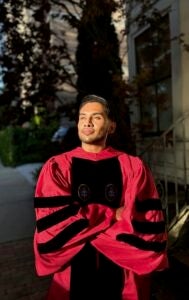
Nile Nair, PhD, is an international postdoctoral research fellow in the Nutrition and Global Health Program at Harvard T.H. Chan School of Public Health. Originally from Fiji and trained as a clinical geneticist and surgical researcher, Nair’s clinical research has primarily focused on maternal-fetal health and diet clinical trials, genetics of inflammatory bowel disease, microbiome interactions with disease, and novel biomarkers of chronic diseases. His work at Harvard University involves studying the effects of climate change and the accelerated nutrition transition on indigenous populations through the lens of dietary colonialism and the disproportionate impacts of climate change on minoritized populations. His research also examines the nexus of climate justice, human nutrition, and planetary health, advocating for more sustainable dietary guidelines to reduce the greenhouse impact of global food systems. Part of Nair’s work involves addressing the structural violence embodied in the current climate crisis and its effects on minority groups in the U.S. and around the world. Nair earned his PhD at Harvard T.H. Chan School of Public Health in population health sciences, with a focus on climate change, and planetary and human health.
September 18, 2024
Investigating Mitochondria
It’s well known that mitochondria are the powerhouse of the cell, but research shows they can also offer new insights into how cells maintain their metabolic balance, potentially leading to novel therapeutic strategies to help fight diseases. Marjana Ndoci, MSc, Harvard T.H. Chan School of Public Health, shares her research on this topic.
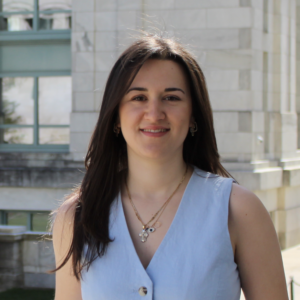
Marjana Ndoci, MSc, is originally from Albania and Greece, and completed her bachelor’s and master’s degrees in the Department of Biological Applications and Technology at the University of Ioannina in Greece. During her studies, she was awarded the Erasmus Studies Fellowship, allowing her to conduct her diploma thesis at the Max Planck Institute for Biology of Ageing. There, she delved into the molecular mechanisms underlying ageing. In 2023, Ndoci was accepted into the Max Planck Graduate School in Germany. She established a collaboration between the labs of professor Andreas Ladurner of Ludwig Maximilians Universität München, and Nora Kory, PhD, assistant professor of molecular metabolism at Harvard T.H. Chan School of Public Health. She joined the Kory Lab as a PhD student. Her research focuses on deciphering the tethering factors of mitochondrial contact sites and understanding their role in metabolic compartmentalization. By studying these intricate connections, Ndoci aims to uncover new insights into how cells maintain their metabolic balance, potentially leading to novel therapeutic strategies.
August 7, 2024
Data Sharing in Community-Engaged Research
Sharing data in the context of community-engaged research involves specialized practices and considerations. Our latest episode, hosted by Karen Emmons, PhD, faculty lead for Harvard Catalyst’s Community Engagement program, discusses critical aspects of data sharing and privacy that researchers need to know with Susan Adams, PMP, and Cheryl Clark, MD, ScD, of Massachusetts League of Community Health Centers.
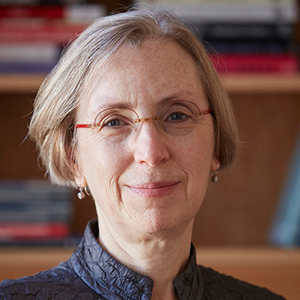
Karen Emmons is faculty lead of Community Engagement at Harvard Catalyst. She is a professor of social and behavioral science at the Harvard T.H. Chan School of Public Health. Emmons is a behavioral scientist with a strong track record of funded research in community-based approaches to cancer prevention in a variety of settings that serve historically disadvantaged communities, including low income housing and community health centers. Her work targets inequalities related to a range of cancer risk factors, including nutrition, physical activity, sun exposure, tobacco and second-hand smoke exposure, and cancer screening. She has particular expertise in implementation science, particularly in community health settings, and has been actively involved in national efforts to develop implementation research and training programs. She is an elected member of the National Academy of Medicine, and past president of the Society of Behavioral Medicine.
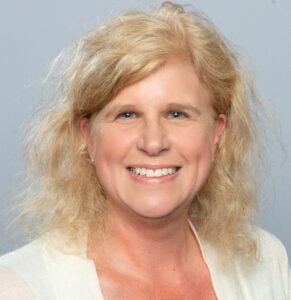
Susan Adams, PMP, is vice president of health informatics for the Massachusetts League of Community Health Centers. In her role, she oversees the Health Center Controlled Network and Health Informatics team, providing technology and data assistance to community health centers across the Commonwealth. Her current work focuses on various digital health tools, interoperability initiatives, and using advance data analytics for identifying and addressing disparities in healthcare for community health centers. Adams has worked in healthcare technology for 30 years, previously serving as the chief information officer for a large federally-qualified health center where she was responsible for the strategic direction and management of information technology, quality data & reporting, medical records, and referrals departments. Her strength lies in her ability to think outside the box and use technology and data to improve operational efficiencies.
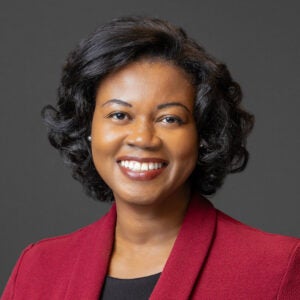
Cheryl Clark, MD, ScD, is the executive director and senior vice president of the Massachusetts League of Community Health Centers’ Institute for Health Equity Research, Evaluation & Policy (IHE). She is also associate chief for equity research and strategic partnerships for the Division of General Internal Medicine and Primary Care at Brigham and Women’s Hospital. Clark is a physician of hospital medicine and a social epidemiologist with a research focus on social determinants of health and healthcare utilization in diverse populations, including preventive care for cancer and cardiovascular disease prevention. She has extensive experience in community-based participatory research, and in the implementation and evaluation of innovative strategies to address social determinants of health and care utilization in communities with high burdens of cardiovascular and cancer risk factors. Clark is the PI of the Mass General Brigham Jackson Heart Study Vanguard Center and PI for engagement of the New England National Institutes of Health All of Us Research Program.
July 24, 2024
Equity, Economics, and Health Outcomes in Cardiology
“[Health equity] is a term that we often listen to, but it involves so many things,” says Frans Serpa, MD, Smith Center for Outcomes Research in Cardiology. On this podcast, Serpa discusses his innovative work at the intersection of cardiology, health equity, and health economics. Tune in to learn more about how common heart conditions and outcomes are evaluated through epidemiology and cost analysis.
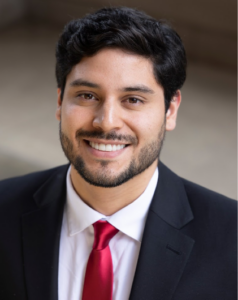
Frans Serpa, MD, is a research fellow at the Smith Center for Outcomes Research in Cardiology, which is affiliated with the Beth Israel Deaconess Medical Center. He has a keen interest in cardiology and has led various research projects exploring the epidemiology, outcomes, and costs associated with different cardiovascular conditions. Under the mentorship of Daniel B. Kramer, MD, MPH, he has refined his knowledge in research, cardiology, and electrophysiology. He has also actively worked in the recruitment and study operations for two NIH-funded RO1s (PIPER-ICD and TRACER-ICD), both nationwide, multisite cohort studies of patients with implantable cardioverter-defibrillators. Serpa is committed to improving healthcare outcomes and promoting health equity among vulnerable populations.
June 20, 2024
Improving Patient Safety
“The National Academy of Medicine said that every American, at least once in their lifetime, will likely experience a diagnostic error, some of which will have devastating consequences,” says Christina Cifra, MD, MS, of Boston Children’s Hospital. In this episode, Cifra discusses her work as a health services researcher focusing on patient safety and ways to prevent diagnostic error.
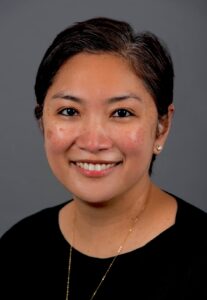
Christina Cifra, MD, MS, is an assistant professor of pediatrics at Harvard Medical School and a health services and patient safety researcher in the field of diagnostic excellence. She is a practicing pediatric intensivist in the Division of Medical Critical Care at Boston Children’s Hospital. Cifra’s current work focuses on diagnostic error epidemiology, the role of diagnostic uncertainty in critical care diagnosis, improving diagnostic process handoffs for interfacility transfers to the ICU, and developing electronic feedback systems between pediatric intensive care units (PICU) and frontline clinical settings. She has published foundational studies on diagnostic error in the PICU and has proposed a unified research agenda for diagnostic excellence in critical medicine. Cifra completed a pediatric critical care fellowship at the Johns Hopkins Hospital and was a resident scholar at the Johns Hopkins Armstrong Institute for Patient Safety and Quality.
May 15, 2024
Understanding Suicide: A Public Health Perspective
“Suicide is not simply a mental health issue, it’s a public health issue,” says Sara Kohlbeck, director of the Division of Suicide Research and Healing at the Medical College of Wisconsin. In this episode, Kohlbeck shares her research, which focuses on understanding suicide among disproportionately affected populations, including farmers, veterans, and youth of color.

Sara Kohlbeck, PhD, MPH, is a suicidologist and the director of the Division of Suicide Research and Healing in the Comprehensive Injury Center at the Medical College of Wisconsin. She is also an assistant professor in the Department of Psychiatry and Behavioral Medicine. Her research interests focus on understanding suicide from a public health perspective. Specifically, she is conducting research that focuses on better understanding suicide among disproportionately affected populations, including farmers, veterans, and youth of color, to facilitate the development of appropriate prevention strategies. She is also engaged in community-based research with communities across Wisconsin who are implementing suicide prevention activities. Kohlbeck received her PhD in public and community health from the Medical College of Wisconsin, her MPH from the University of Wisconsin-Milwaukee, and her BS in education from the University of Wisconsin-Oshkosh.
April 17, 2024
Improving Health Outcomes for Children
“We need to better meet the needs of children and families by understanding what their needs are and addressing that in the care we deliver,” says Meg Simione, PhD, of Massachusetts General Hospital. In this episode, Simione shares her research examining the determinants and impacts of pediatric disorders and ways to improve access to care through implementation science.
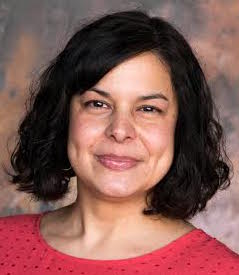
Meg Simione, PhD, is a clinician-scientist who focuses on infant and child feeding by implementing innovations to improve care delivery. She is a research scientist in the Division of General Academic Pediatrics at Massachusetts General Hospital, a speech-language pathologist, and assistant professor of pediatrics at Harvard Medical School. Her research has examined the determinants and impacts of pediatric feeding disorders and childhood obesity, as well as improving access to care through implementation science, telehealth approaches, and family-centered outcomes. As a clinician, she cares for children with pediatric feeding disorders and has developed clinical programs and quality improvement initiatives to improve care for these children. Simione’s research has been funded by the National Institutes of Health and foundations. She has authored numerous publications and has presented nationally and internationally.
March 27, 2024
Social Inequality in STEM
How do social inequity dimensions such as race, gender, socioeconomic status, and citizenship impact STEM education? In our latest episode, Mayank Chugh, PhD, of Harvard Medical School discusses his research.
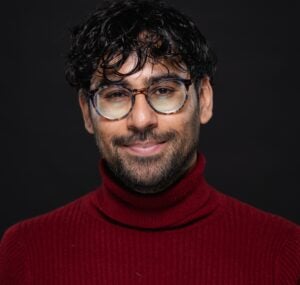
Mayank Chugh, PhD, (he/him) is a postdoctoral research fellow in the Department of Systems Biology with Sean Megason, PhD, at Harvard Medical School. He is an early-career advisor at eLife Sciences Publications and an incoming member of the board of directors at the Journal of Emerging Investigators (JEI). He is also the former chair of the Harvard Medical Postdoc Association. Chugh is fascinated about how organisms are designed and constructed from a single cell and approaches this in the context of inner ear formation in zebrafish. During his biology postdoc, he pivoted his research direction to empirically investigate how social inequity dimensions (race, gender, citizenship, and socioeconomic status) shape STEM higher education workforce and innovation. His published research and policy recommendations on cost-of-living adjusted postdoc compensation gathered national attention. He is currently leading research on citizenship privilege and visas to facilitate global knowledge equity. Chugh aims to create unchartered bridges between social sciences and STEM disciplines to inform equitable policies and practices in academic institutions.

